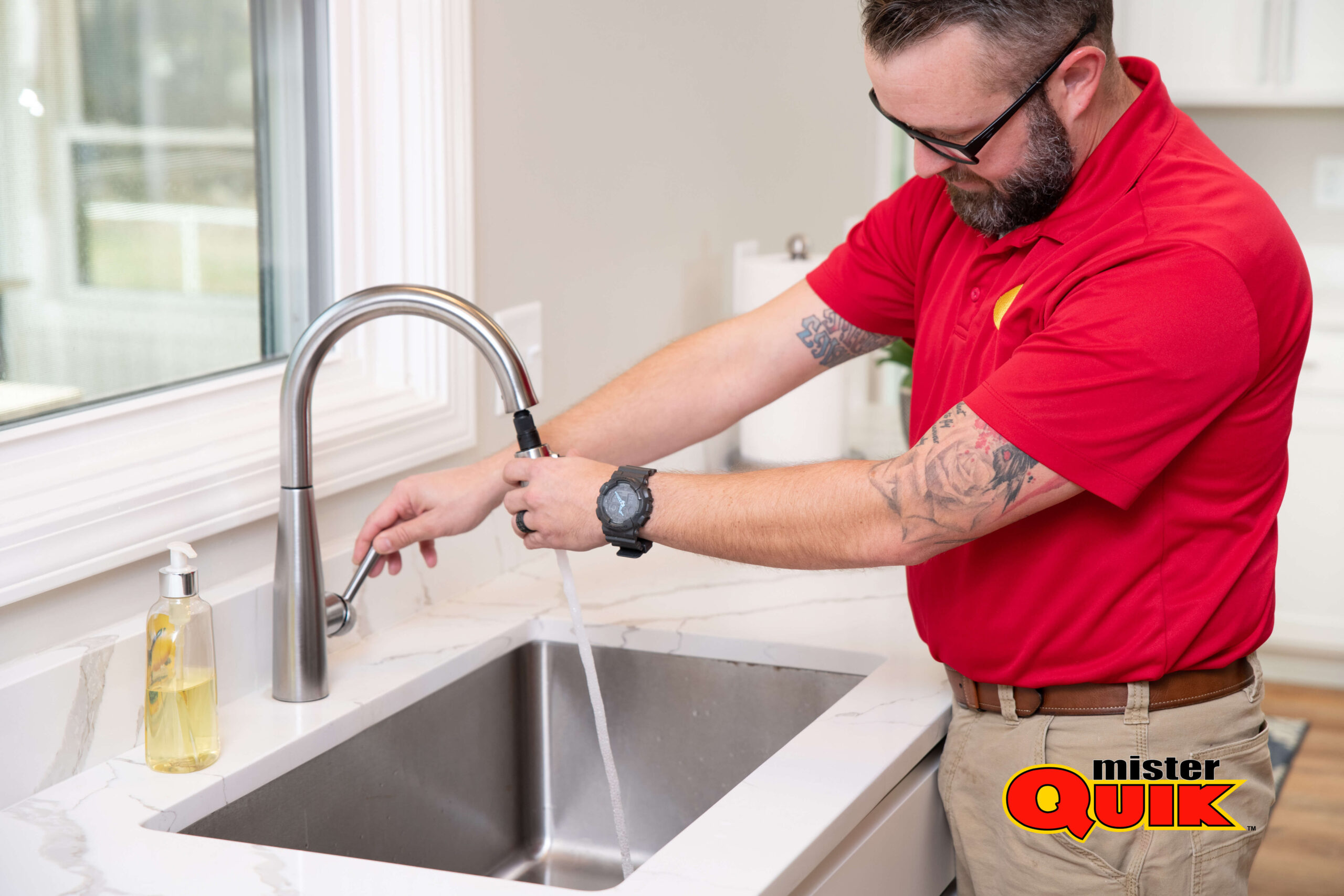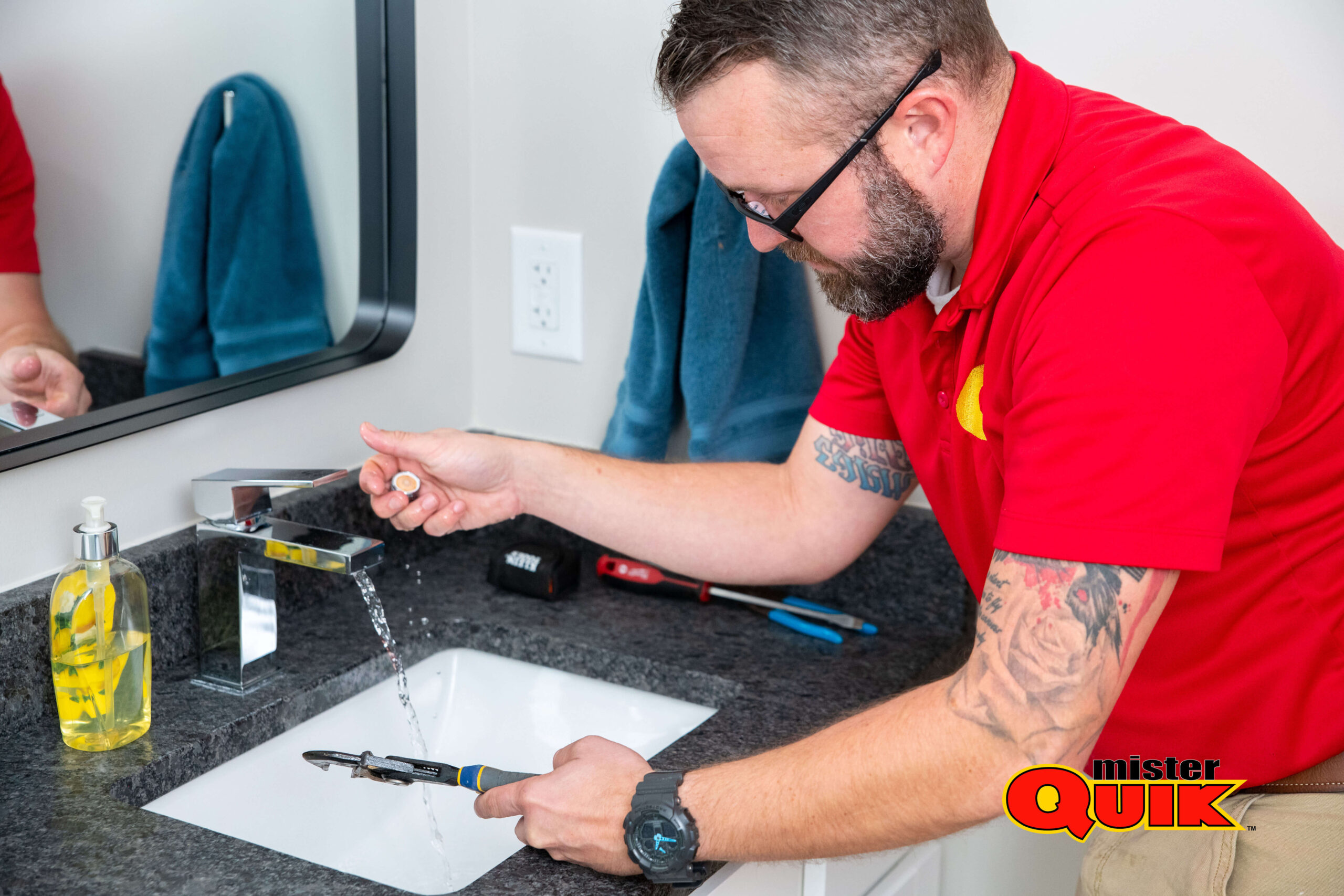Tankless Water Heater
Schedule on your own without making a call. Click the button below to get started!

Tankless Water Heater Pros and Cons
Considering a tankless water heater? Here’s a comparison of the pros and cons to help you decide:
Pros:
1. Energy Efficiency: Tankless water heaters heat water on demand, reducing energy consumption compared to traditional tank heaters, which continuously heat water.
2. Space-Saving: Tankless heaters are compact and mount on walls, saving valuable floor space compared to bulky tank heaters.
3. Endless Hot Water: With tankless heaters, you’ll never run out of hot water since they heat water as needed, providing a continuous supply.
4. Longevity: Tankless heaters typically last longer than tank heaters, with a lifespan of up to 15+ years, reducing the need for frequent replacements.
5. Reduced Risk of Leaks: Since tankless heaters don’t store water, there’s a lower risk of leaks and water damage compared to tank heaters.
Cons:
1. Higher Initial Cost: Tankless water heaters have a higher upfront cost than tank heaters due to their advanced technology and installation requirements.
2. Limited Flow Rate: Tankless heaters may struggle to meet high-demand scenarios simultaneously, such as running multiple showers, due to their limited flow rate.
3. Installation Complexity: Installing tankless heaters may require modifications to existing plumbing and electrical systems, increasing installation complexity and cost.
5. Dependency on Electricity or Gas: Tankless heaters rely on electricity or gas to operate, so power outages or gas supply interruptions can temporarily disrupt hot water availability.
Considering these factors can help you determine if tankless water heater plumbing is the right choice for your home.
Tankless Water Heater Cost
Considering a tankless water heater? Here’s a breakdown of the costs involved:
Tankless water heaters typically have a higher upfront cost compared to traditional tank heaters. The price varies depending on factors such as brand, size, and features. Expect to pay more for models with higher flow rates or energy-saving features.
Installing a tankless water heater may require modifications to your home's plumbing and electrical systems. Factors like the complexity of installation, location of the heater, and any necessary upgrades can impact installation costs. It's essential to hire a professional plumber experienced in tankless water heater plumbing to ensure proper installation.
While tankless water heaters are more expensive upfront, they can lead to long-term savings on energy bills. Tankless heaters heat water on demand, eliminating standby heat loss associated with tank heaters, which continuously heat water even when not in use
Tankless water heaters generally require less maintenance than tank heaters but may incur higher repair costs due to their complex components. Routine maintenance, such as flushing the system to remove mineral buildup, can help prevent costly repairs and prolong the heater's lifespan.
Despite the higher initial investment, tankless water heaters offer potential long-term savings through lower energy bills and reduced water heating costs. Consider the lifetime cost of ownership, including energy savings and maintenance expenses, when evaluating the overall value of a tankless water heater.
Tankless water heaters typically have a longer lifespan compared to traditional tank water heaters, often lasting up to 15+ years or more with proper maintenance. The absence of a tank means there’s less risk of corrosion and leakage, contributing to their durability. Regular maintenance, such as flushing the system annually, can help ensure optimal performance and extend the lifespan. Factors like water quality and usage patterns can also influence how long a tankless water heater will last, but generally, they offer a reliable and long-lasting solution for providing hot water.
Tankless water heaters provide an on-demand supply of hot water, eliminating the risk of running out as they heat water instantly as it flows through the unit. However, the capacity of a tankless heater depends on its size and the temperature rise required, meaning that if demand exceeds its capacity, it can struggle to keep up with simultaneous hot water needs. Proper sizing and installation are crucial to ensure continuous hot water availability for a household’s specific needs.
The cost of converting a water heater to tankless varies based on factors such as the type of tankless system chosen, installation requirements, and any additional plumbing or electrical work needed. Generally, the total expenses encompass the price of the tankless unit itself, installation labor costs, potential modifications to accommodate the new system, as well as any associated permits and fees. Factors such as the size and complexity of the installation, the brand and efficiency of the tankless water heater, and regional labor rates can all influence the overall cost of the conversion. It’s advisable to obtain quotes from reputable contractors to get a precise estimate tailored to specific needs and circumstances.
Yes, it’s possible to replace your 40-gallon water heater with a tankless water heater. Tankless water heaters provide hot water on demand, which can be more energy-efficient and space-saving compared to traditional tank-style heaters. However, it’s essential to consider factors such as your household’s hot water usage patterns, the size of your home, and the availability of appropriate utility connections before making the switch. Additionally, installation costs and potential modifications to your plumbing system should be taken into account to ensure a successful transition to a tankless system.
Tankless water heaters typically have a longer lifespan compared to traditional tank water heaters, ranging from 10-15+ years on average with proper maintenance. The durability largely depends on factors such as water quality, installation quality, and usage patterns. Regular maintenance, including descaling and flushing, can extend their lifespan. While tankless water heaters might have a higher upfront cost, their longevity often translates to cost savings over time due to reduced energy consumption and fewer replacements needed.
Tankless Water Heater Vs. Tank
Considering whether to go tankless or stick with a traditional tank water heater? Let’s compare:


- Space Efficiency:
- Tankless: These heaters are compact and mounted on walls, saving valuable floor space. Perfect for smaller homes or tight utility closets.
- Tank: Traditional tanks are bulky and require a dedicated storage space, typically in a basement or utility room.
- Energy Efficiency:
- Tankless: They heat water on demand, so they don’t continuously heat and store hot water like tank heaters. This can result in lower energy bills over time.
- Tank: Tank heaters keep a large volume of water hot at all times, leading to standby heat loss and higher energy consumption.
- Hot Water Supply:
- Tankless: Delivers a continuous supply of hot water on demand. No more worrying about running out of hot water during long showers or laundry cycles.
- Tank: Limited hot water capacity. Once the tank is depleted, you’ll need to wait for it to refill and reheat, which can be inconvenient during peak usage times.
- Lifespan:
- Tankless: Typically have a longer lifespan than tank heaters, lasting up to 15+ years or more with proper maintenance.
- Tank: Tanks typically last around 7-10 years before needing replacement, making tankless heaters a more durable option in the long run.
- Upfront Cost:
- Tankless: Initial installation costs are higher due to equipment and installation complexity, but long-term energy savings can offset this investment.
- Tank: Generally less expensive upfront, but higher energy bills and shorter lifespan may lead to higher overall costs over time.
Consider your household’s hot water needs, budget, and space constraints when deciding between tankless and tank water heater plumbing.
Best Tankless Water Heater
Choosing the best tankless water heater for your home can improve energy efficiency and provide endless hot water. Here’s what to consider:


Tankless water heaters are rated by their maximum flow rate, measured in gallons per minute (GPM). Consider your household's hot water demands to ensure the heater can meet your needs during peak usage times.


Look for ENERGY STAR-certified tankless water heaters, which meet strict energy efficiency criteria. These units consume less energy, helping you save on utility bills while reducing environmental impact.



Tankless water heaters come in various sizes, so choose one that fits your available installation space. Consider mounting options and ventilation requirements to ensure proper installation.



Tankless water heaters are available in electric, natural gas, and propane models. Choose the fuel type that's most convenient and cost-effective for your home. Gas models generally offer higher flow rates but require proper ventilation.
Tankless Water Heater Installation
Installing a tankless water heater can bring many benefits to your home, but it’s essential to understand the installation process. Here’s what you need to know:
- Assessment and Planning:
- Before installation, our experts will assess your home’s hot water needs and evaluate the best location for the tankless water heater. Factors such as available space, fuel type, and plumbing requirements will be considered.
- Sizing and Capacity:
- Proper sizing is crucial to ensure your tankless water heater meets your household’s hot water demands. Our technicians will calculate the required capacity based on factors like the number of fixtures and simultaneous hot water usage.
- Fuel Source:
- Tankless water heaters are available in electric, natural gas, and propane models. Depending on your home’s existing infrastructure and preferences, we’ll help you choose the right fuel source for your tankless water heater plumbing.
- Ventilation and Exhaust:
- Proper ventilation is essential for gas-powered tankless water heaters to safely exhaust combustion gasses. Our technicians will ensure that the unit is installed according to manufacturer specifications and local building codes to prevent any safety hazards.
Tankless Water Heater Maintenance
Maintaining your tankless water heater is essential to ensure its longevity and efficiency. Here’s what you need to know about tankless water heater maintenance:
Over time, mineral deposits can accumulate inside the tankless water heater, affecting its performance. Flushing the system annually helps remove these deposits and maintain optimal flow and efficiency.
Regularly inspect the unit and surrounding areas for any signs of leaks or drips. Addressing leaks promptly can prevent water damage and costly repairs. Our technicians can perform a thorough inspection to identify and repair any leaks.
The pressure relief valve is a crucial safety feature that releases excess pressure from the tank. Testing this valve annually ensures it's functioning correctly and prevents potential hazards. Our experts will check and test the valve during maintenance visits.
Proper ventilation is essential for gas-powered tankless water heaters to safely exhaust combustion gasses. Ensure that the venting system is clear of obstructions and functioning correctly to prevent carbon monoxide buildup. Our technicians can inspect and clean the ventilation system as needed.
Modern tankless water heaters are equipped with diagnostic systems that display error codes to indicate any issues. Regularly check for error codes on the unit's display panel and address them promptly. Our technicians are trained to interpret error codes and perform necessary repairs.
Don’t wait until your tankless water heater encounters problems. Contact Mister Quik Home Services today to schedule your maintenance service and keep your unit running smoothly.
- Check for power supply: Ensure the unit is receiving power by checking the circuit breaker or fuse box.
- Inspect gas supply: Verify that the gas valve is open and that there is an adequate supply of gas to the unit.
- Check for debris: Mineral buildup or debris in the water line can cause fluctuations. Flush the system to remove any obstructions.
- Adjust flow rate: If the flow rate is too high, the unit may struggle to maintain a consistent temperature. Adjust the flow rate as needed.
- Refer to manual: Consult the owner’s manual to interpret the error code displayed on the unit’s control panel.
- Reset the unit: Try resetting the unit by turning it off, waiting a few minutes, and then turning it back on to clear minor errors.
- Turn off the gas supply: If you detect a gas odor or suspect a leak, immediately turn off the gas supply to the unit.
- Ventilation inspection: Check for proper ventilation and ensure there are no obstructions in the venting system that could cause gas buildup.
- Check for scale buildup: Mineral deposits inside the unit can cause noise. Flush the system to remove scale buildup and improve performance.
- Inspect components: Check for loose connections or damaged components that could be causing noise and tighten or replace as necessary.







